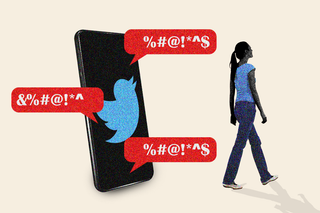
As Twitter Transitions Into a New Era, Users Contemplate Migrating Away
Hate speech has risen and verification may no longer be free since Musk’s takeover, prompting questions about what Twitter was fundamentally about.

Mastodon is back in the limelight. On Sunday alone, the open-source, decentralized social media platform that was first launched in 2016, saw 70,000 new sign-ups. The platform announced this news on Twitter — the microblogging platform it aims to offer an alternative to, especially since it has become a site of immense turmoil since October 27th, when Elon Musk officially took charge. The increase in the number of Mastodon users colliding with Musk taking over Twitter is no coincidence. It is, in fact, a possible signal of people’s increasing uneasiness with Musk’s promises to herald a new era of free speech and uncensored expression on the platform. And it’s also a reckoning with Twitter’s fundamental essence.
Just a day into Musk’s takeover, Network Contagion Research Institute, a Princeton-based organization that tracks cyber-social threats, reported a 500% surge in the use of the n-word on the social media platform. Further, The Washington Post also noted a steep rise in racist and Nazi memes on the website. “Racial slurs were posted rampantly. One single-word tweet, showing a single racial slur in all capital letters, was retweeted more than 700 times and liked more than 5,000 times. It was tweeted Thursday night and remained online more than 16 hours later,” the report observed. Further, The Washington Post also noted that anti-LGBTQ and transphobic posts on the platform also multiplied since Musk’s takeover.
The Musk-led Twitter, however, blamed this surge of hateful posts on an “organized trolling campaign” against Musk, ironically noted to be a troll himself on several occasions.
That’s not all. Only a few days later as “Chief Twit,” moreover, Musk has already changed several things about the platform. And more change is underway. As he took over, Musk fired key executive staff — including now-former CEO Parag Agarwal — from the platform’s management. Soon after, the microblogging site — a public company for the last nine years — filed regulatory papers to the New York Stock Exchange asking to be delisted, essentially transitioning to centralized control with much less scrutiny. Since he assumed charge, the billionaire also tweeted a steady series of idiosyncratic statements, such as, “the bird is freed“, and “Comedy is now legal on Twitter.” Notably, earlier this year, Musk promised to reverse the permanent ban the site had imposed on former American President Donald Trump following the latter’s tweets on the Capitol Hill Violence in January 2021.
Musk, like other billionaires and rich conservatives, is a relentless warrior against “wokeism,” having opined in the past that “At its heart, wokeness is divisive, exclusionary, and hateful. It basically gives mean people a shield to be mean and cruel, armored in false virtue.” Musk’s comments, stemming at that time as a response to criticism against Dave Chappelle’s transphobic humor, reflect what the privileged think of criticism and of being respectful to diverse opinions and ways of life. Unsurprisingly, then, Musk — a self-proclaimed “free speech absolutist” — taking over Twitter was widely celebrated in conservative circles. On Twitter, this celebration manifested in a manifold rise in hateful posts.
Related on The Swaddle:
Elon Musk is Now Twitter’s Biggest Shareholder, but His Free Speech Agenda is Misleading
Beyond his tirades against “wokeism”, and his championing of uncensored hatred as “free speech,” Musk has other plans for Twitter that could significantly alter the character of Twitter and its function — in Musk’s own words — as the “de-facto public town square” of the internet. Although it has far lesser users and is much less profitable than other social media giants, Twitter always has been a significant space for informing the world about all that is happening. It remains an influential tool in shaping culture, politics, and news — and in spreading it across. And an important and influential tool that helps in this process is the blue tick, something that Musk plans to change, according to a report by The Verge. Reportedly, Musk has asked his employees to devise a new subscription plan for the verification badge, allowing users to buy their way into the blue tick for a subscription fee of $20 — or ₹1650 — a month.
The blue tick or verification badge is how Twitter signals that a user or organization — often of public significance — is official. It helps public figures and organizations mark their voice as their own, and distinguish themselves from anonymous accounts and trolls. Social media platforms are often rife with unregulated content and disinformation and the verification badge can often act as a tool for filtering genuine information from fake ones. Of course, verified accounts often may themselves engage in hate-speech and disinformation, but even in those circumstances, a verified badge may help ascertain that the hatred and wrong information is indeed coming from an influential figure or organization — and that knowledge can help people in holding them more accountable.
“The [new] directive is to change Twitter Blue, the company’s optional, $4.99 a month subscription that unlocks additional features, into a more expensive subscription that also verifies users,” The Verge reported, adding that, “Under the current plan, verified users would have 90 days to subscribe or lose their blue checkmark.”
Even in its current iteration, the blue tick is rightly criticized for creating hierarchies in the digital world and going against the grain of internet equality. A situation where people could buy their way to the badge, however, would be significantly more divisive and hierarchical, with money and access to capital standing in for credibility. Given that the current verified users — a lot of whom are independent journalists and activists working with limited resources — would also lose out on their badges in 90 days of the new verification regime unless they can pay the hefty $20-a-month amount, is a signal that there is little concern for actual independence and free speech when the public square of the internet is controlled by one conservative billionaire.
Musk’s changes — and his vision for the platform — have already altered its public character. The official handle of the Auschwitz Memorial tweeted that they lost about 2,500 followers in a single day — the same day that saw a manifold rise in hate tweets against Jews. Black activists and users also noted the surge in racist tweets, with many of them announcing Twitter has started to lose its sheen and they would soon be exiting it. Star basketball player LeBron James reprimanded Musk for inaction against the 500% increase in n-word tweets.
With Musk now planning to fundamentally alter the verification rules, more change seems underway. More migration also, then, seems likely. These incidents indicate that Twitter, indeed, has entered a new era.
Amlan Sarkar is a staff writer at TheSwaddle. He writes about the intersection between pop culture and politics. You can reach him on Instagram @amlansarkr.
Related


YouTube Shorts Is Pushing Transphobic Content, Creators Allege
